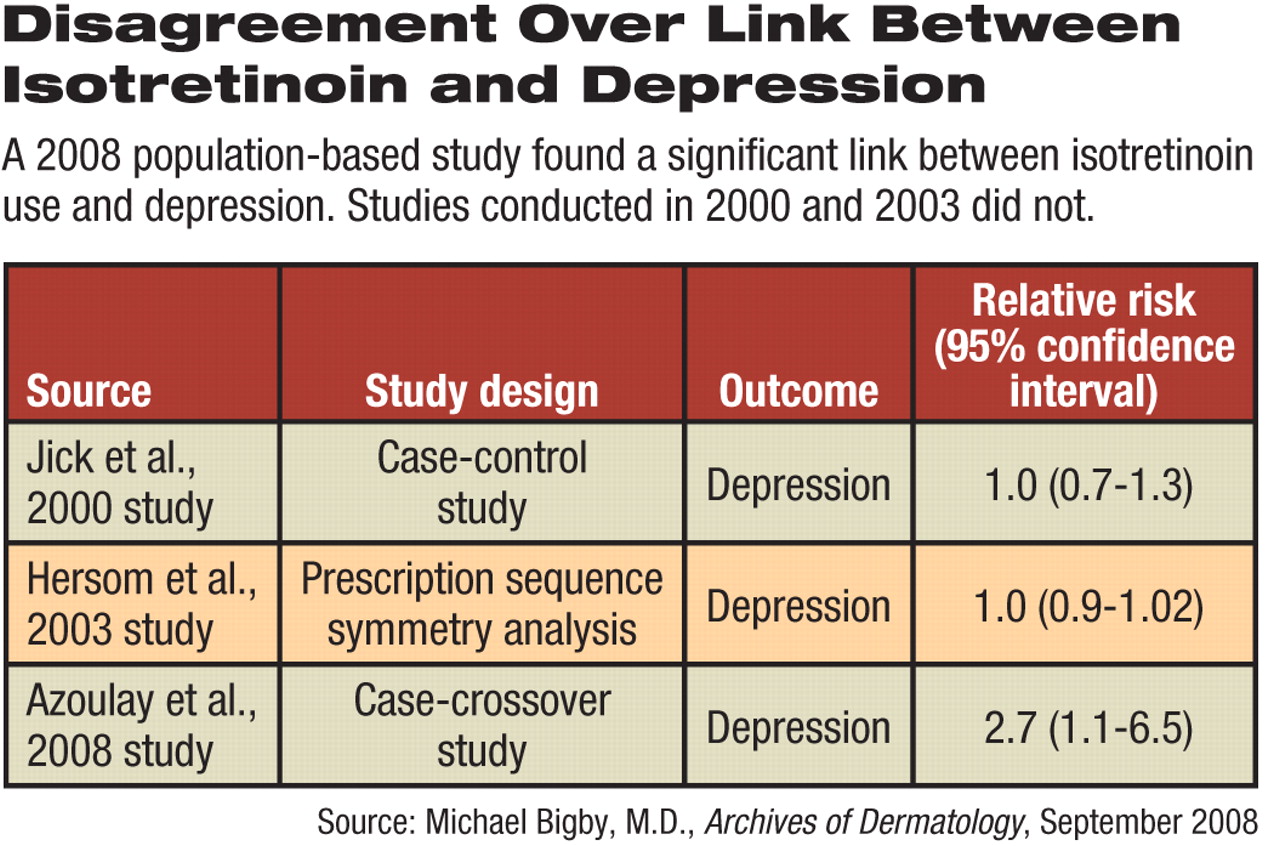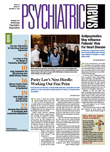Although there is little doubt that the acne drug isotretinoin can dramatically counter acne, it has been under suspicion for years as a possible trigger of depression.
Between 1982 (when the drug was first marketed) and 2000, 394 cases of depression and 37 cases of suicide in persons who were taking, or had taken, isotretinoin were reported to the Food and Drug Administration (FDA). As a result, the FDA required that increasingly stringent warnings regarding the risks of depression and suicide be included with the drug. As of 2005, warnings had to state that isotretinoin “may cause depression, psychosis, and, rarely, suicidal ideation....”
Meanwhile, three population studies, using different tacks, have explored whether isotretinoin can cause depression.
The most recent study, headed by Laurent Azoulay, M.Sc., of the University of Montreal and published in the April Journal of Clinical Psychiatry, included 126 individuals who had been hospitalized for depression at some point between 1984 and 2003 and who had used isotretinoin for acne during the five-month period immediately preceding their hospitalization for depression.
Azoulay and his colleagues then looked to see whether the subjects' risk of being hospitalized for depression was different after getting isotretinoin than it had been during a five-month (control) period where they had not gotten isotretinoin. The control period was defined as a five-month period that started 12 months before the diagnosis of depression and was separated from the five-month risk period by a two-month washout period.
They found that the subjects' risk of being hospitalized for depression was almost three times greater after using isotretinoin than before. Moreover, this result held firm even when dermatologic visits to adjust isotretinoin dosage, the use of other prescription drugs besides isotretinoin, or some other possibly confounding factors were considered.
“This is the first controlled study to find a statistically significant association between isotretinoin and depression,” Azoulay and his colleagues concluded in their study report. “Because depression could have serious consequences, close monitoring of isotretinoin users is indicated.”
However, in a commentary in the September Archives of Dermatology, Harvard University dermatologist Michael Bigby, M.D., cautioned that the study conducted by Azoulay and his group has certain weaknesses. For instance,“ the case-crossover method is one that is not commonly used [in medical research],” he said, and “since the relative-risk estimate was based on a very small subset of patients who filled very strict criteria for depression ... the results may not be generalizable to a general population of patients treated with isotretinoin.”
Moreover, the two other population studies that explored whether isotretinoin can cause depression produced negative results, Bigby reported.
One, headed by Susan Jick, D.Sc., of Boston University, included some 20,000 subjects with acne. Some were using isotretinoin for their acne, others antibiotics. Jick and her team compared the risk of depression between the two groups and found that it was comparable in both. Results were published in the October 2000 Archives of Dermatology (Psychiatric News, May 4, 2001).
The other study, headed by Kimberly Hersom, M.P.H., of Quintiles Late Phase, a pharmaceutical-services company in San Francisco, consisted of a review of pharmacy claims in a nationwide database looking for connections between prescriptions for isotretinoin and prescriptions for antidepressants. Among 2,821 patients who had filled prescriptions for both, 1,439 filled the antidepressant prescription first, and 1,382 filled it after getting isotretinoin. Thus, there was no evidence of a link between isotretinoin and antidepressants, and thus, presumably, no link between isotretinoin and depression, the scientists concluded in the September 2003 Journal of the American Academy of Dermatology (Psychiatric News, November 7, 2003).
Bigby pointed out, however, that both the Jick and Hersom studies had their weaknesses as well. For example, both were funded by Roche, the maker of isotretinoin. In contrast, the study by Azoulay and colleagues was funded by the Canadian Institutes of Health Research. And the results obtained by Azoulay and his group are bolstered, of course, by the cases reported to the FDA that link isotretinoin to depression and suicide.
So whether “isotretinoin increases the risk of depression has neither been proven nor disproved,” Bigby concluded. Nonetheless, he stressed,“ Since the consequence of depression in young patients with acne can be quite severe (significant morbidity and death), it is prudent to advise patients starting or wanting to start isotretinoin therapy that the possibility of an association with depression has been raised and to provide some estimate of the magnitude of the risk.”
An abstract of “Isotretinoin and the Risk of Depression in Patients With Acne Vulgaris: A Case-Crossover Study” is posted at<www.psychiatrist.com/abstracts/abstracts.asp?abstract=200804/040803.htm>. An extract of “Does Isotretinoin Increase the Risk of Depression?” is posted at<http://archderm.ama-assn.org/cgi/content/extract/144/9/1197>.▪

